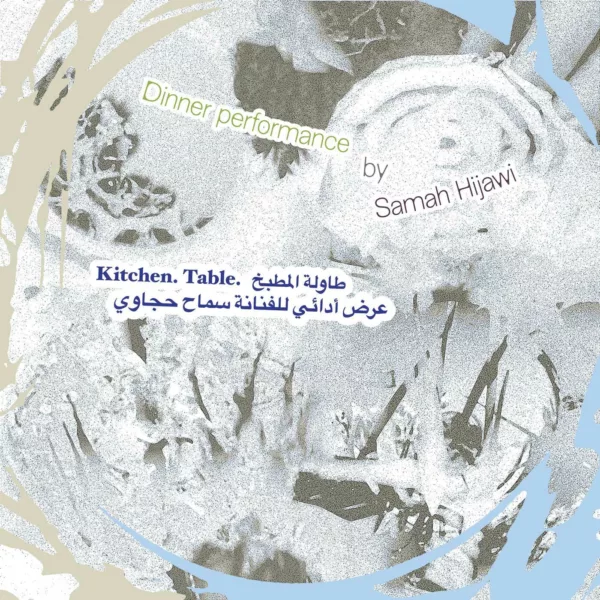Studium Generale - Land, Communes, Cooperatives, and Self-Sufficiency
Programme of EarthCraft's Kindred Soils session #3
Location: Auditorium, KABK, The Hague
14:00 - 17:00 CET
~ Screenings of Marwa Arsanios ‘Who is Afraid of Ideology?’ Part 1, 2, 3 and 4
17:30 - 19:00 CET
~ Food hosted by Radical Roots resonating with Sankrit
19:00 - 20:30 CET
~ Patricia de Vries in conversation with Marwa Arsanios
Watch below a recording of the lecture of 13 April 2023
Playlist material
Screenings of Marwa Arsanios ‘Who is Afraid of Ideology?’ Part 1, 2, 3 and 4
Taking a collaborative and interdisciplinary approach to research and filmmaking, Arsanios confronts long-established political and socioeconomic systems of oppression and exploitation by portraying alternative ways of living in harmony with nature. Women’s lived experiences and anti-colonial struggles marked by collectivism, care and self-defence become an example for wider social and political change.
In Part 1 (2017) & Part 2 (2019) of Who Is Afraid of Ideology?, Arsanios addresses forms of self-governance and knowledge production that have emerged from the Kurdish autonomous women’s movement. Part 3: Micro Resistencias (2020), takes place in Tolima, Colombia, and focuses on the current systemic war led by transnational corporations against the tiniest and most essential aspect of life: seeds. The last film in this quadrilogy, Part 4: A Letter Inside a Letter (2021–ongoing), examines the issues of inheritance, ownership, property and value through questioning the neoliberal politics of visibility and invisibility.
Bio Marva Arsanios
Marwa Arsanios’ (she/her)practice tackles structural and infrastructural questions using different devices, forms and strategies, from architectural spaces, their transformation and adaptability throughout conflict, to artist run spaces and temporary conventions between feminist communes and cooperatives, the practice tends to make space within and parallel to existing art structures allowing experimentation with different kind of politics. Film becomes another form and a space for connecting struggles in the way images refer to each other.
In the past four years Arsanios has been attempting to think about these questions from a new materialist and a historical materialist perspective through different feminist movements that are struggling for their land. She tries to look at questions of property, law, economy and ecology from specific plots of land. The main protagonists become these lands and the people who work them.
Bio Patricia de Vries
Patricia de Vries is professor of Art & Spatial Praxis at the Gerrit Rietveld Academie. Her research focuses on artistic practices that tell different stories about and intervene in our urban environment. Previously, she worked as an assistant professor of philosophy at Maastricht University and as a researcher at the Institute of Network Cultures in Amsterdam.
Food hosted by Radical Roots resonating with Sankrit
Moon governs moisture
Inspired by Marwa Arsanios' film mentioning the Indigenous farming methods that rely on the Moon, and by the concept of biodynamics farming and its relationship to celestial bodies, and on the footsteps of Mayis' grandmother Emine, who had her own methods of connecting to her hazelnut orchard & learning through them how much hazelnuts they would be gifted that year by those unpredictable friends; we will center this intervention on the Moon and the cosmic energies that reflect and connect to our soils. On the day of our intervention, the Moon will be in its Last Quarter phase.
There will be a table set up with 12 bamboo steamers, as an ode to 12 sections of the sky with its signs. In the steamers there will be mantı, a moist, delicious Turkish meal, eaten with a garlic tomato sauce and some yoghurt; a common food for the Ramadan time. Ramadan is a Moon holiday, called "the sultan of the 11 moons". The towering steamers recalling the plant stems going high, fast, encouraged by the pull of the Moon.
Shredded vegetables alluding to the roots; roots always finding their way towards the gravity. Corn seeds as dots lining up celestial symbols. Sponge mushrooms, moist and big.
Mirrors bringing in literal reflection too.
Bio Lina Bravo Mora
Lina Bravo Mora (she/they) is a queer intersectional feminist with a background in anthropology and worked as an artist and conflict transformation facilitator. She is currently coursing the MA in Ecologies of Transformation at the Sandberg Instituut, learning about somatics, Nervous system regulation, and trauma-informed research, and she is integrating these into her work. Her main interest is finding paths for the creative construction of Peace cultures through carefully exploring "non-innocent entanglements” with our territories and histories. She works on creating spaces and experiences for nourishment and rest. She works with material storytelling creating installations, lecture-performances, videos, and workshops/laboratories for diverse communities.
Bio Mayis Rukel
Mayis Rukel (he/they) is a Turkish artist, writer, film and performance maker with a background in politics, literature and philosophy. Currently based in Rotterdam. His works are my methods of cultivating survival in the afterlives of colonialism, towards healing, liberation and abolition. Among many of his sources, humor and vulnerability shape his narratives often; supporting movement through the pain that comes with daring to imagine the end of the carceral world and opening up to the possibilities of creating a million others based in care. He is currently researching embodied social justice in his practice at the Sandberg Institute master's program Ecologies of Transformation (2021-2023), curated & led by Camille Barton.
Bio Sankrit Kulmanochawong
Sankrit Kulmanochawong’s (he/him) work is inspired by everyday life. His intervention shines a light on visual discrepancies and cultural clashes that often go unnoticed. Born in Bangkok and based in Amsterdam, Sankrit uses food, graphic design and imagery to focus on the minor details that get lost in the world. He is currently working in the project kitchen at the Sandberg Instituut where he often explores the potential of food to activate and facilitate conversations within a social gathering.
Details
Datum
Locatie
Meer info
Part of the Spring Cycle series of lectures Earth Craft - Studium Generale 2022-2023





